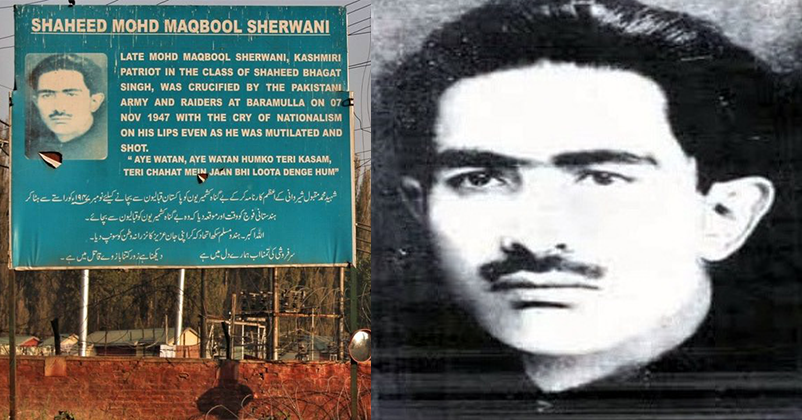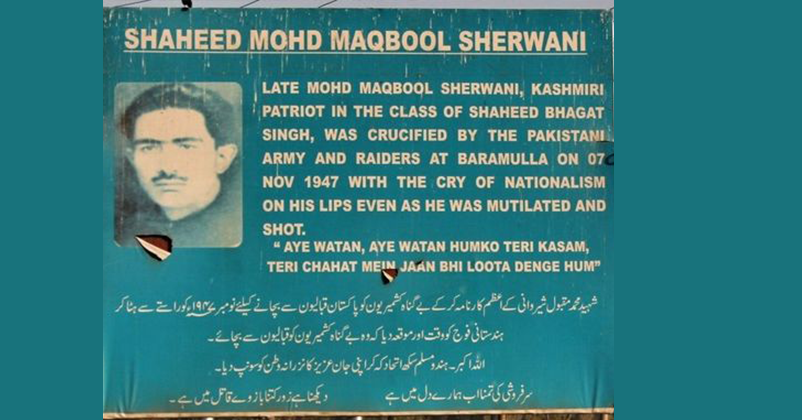The Unforgettable Legacy of Maqbool Sherwani: : A Heroic Tale of Courage and Nationalistic Pride of 1947 war between India-Pakistan
| 14-Mar-2023 |

We are always told that the debt of our motherland can’t be paid but some people are born different, and they do things in a different way. One of such distinguished personality was Maqbool Sherwani, now imagine a young lad who is full of life, and he is not so different from most of the late teens out there but he has a deep inclination towards his motherland and he leaves a legacy that would most probably never be fulfilled. The lines were not meant to grip you as such, but it is more like we are trying that you as an audience try to understand the gravity of the situation and the legacy that his name MR. Maqbool Sherwani has, and the amount of weight that we have on us that you know his side of the story.
Sherwani came into the limelight in 1944 when Mohammad Ali Jinnah came to Kashmir in 1944 and both were there on the stage. Jinnah decided to propagate his 2-nation theory While addressing the mammoth gathering at Baramulla, and made appeals in the name of religion, Sherwani dismantled the communal politics of the Muslim League and tried to put a garland of shoes around his neck. He forced him to come down the platform and stopped his speech. As Sherwani was against the principles of communal politics of the Muslim League.
This bold and humiliating action of Maqbool Sherwani made Jinnanh unnerved and he left Jammu Kashmir after this momentous event. This episode symbolized sherwani’s brave persona as well as ideological opposition to Jinnah. No one else among Kashmir’s political leaders could dare to stand up against Jinnah. The news of this meeting splashed all over India, and pro-leaguers press and followers felt bitter and expressed violent feelings against Sherwani.
Sherwani had a close friendship with many Swayam Sewaks working actively in the town of Baramulla. He considered himself part of the Kashmiri Hindu fraternity and even came to the rescue of the Kashmiri Pandit families of the neighboring area of Sopore. Denouncing their merciless killings and subsequent migration out of fear, Sherwani lashed out at local leaders for stopping the pundits from leaving the town and protecting them. He personally met the suffering Kashmiri Pandit families and even stayed in the town till the morning of 29 October 1947 to save their honour and dignity. His role in saving the Kashmiri Pandits of Sopore during the Pakistani army's invasion in 22 October 1947 will be written in the golden letters.
To understand the significance that he holds in the first war between India and Pakistan we will have to go back on the fateful day of 26 October 1947, when the Pakistani armymen disguised as tribals sacked Baramulla, the largest commercial center and the most prosperous town of a valley at that time with a population of nearly 16 thousand people. Theseinvaders rampaged at this strategic entry point and advanced further to capture Srinagar which was only one hour drive from Baramula. For three days, they were engaged in raping and pillaging, the members of Sikh and Hindu communities being the main targets. Their properties were looted, houses were burnt, their women folk were raped. Realizing the gravity of the situation that if the rebels continue to move forward not only we lose our people but if they reach Srinagar we will also lose our airport and if the airport is lost Indian armed forces won’t be able to intervene because we won’t be able to land our forces so he played with the information given to invaders in such a way that the terrorists were not able to capture the airport.
Sherwani, unmindful of his own safety, to frustrate the Pakistani armymens’ advance towards Srinagar, he convincingly misinformed them, diverted them, and made them wander aimlessly in the Sumbal area on the wrong routes. His display of presence of mind exhausted their precious time till the troops of the Sikh Regiment of the Indian army could reach Srinagar for its defense, thus, dismantling the plan by Pakistani strategists to capture and control the Srinagar airport and cutting it off from the rest of India.

However, after realizing that they were being misguided, the dreaded raiders chased Sherwani, who was in sumbal, 35 km away from Baramulla. To punish him for making an intentional delay, raiders dragged him back to Baramulla. To teach him a lesson for misguiding them and to create horrors in the minds of the people, he was crucified in the central square of Baramula. Even when the blood was oozing out of the wounds on his body, the Pakistani armymen wrote 'Kafir' on his shirt with his own blood. Sherwani preferred death to the betrayal of his country. The Paki invaders offered to set him free if he would shout the slogan “Pakistan Zindabad”. Instead, Maqbool Sherwani spat in the face of the and shouted the popular slogan “Hindu-Muslim-Sikh Itihad, Azad Hindustan Zindabad”. This provoked the invaders, who in a fit of anger, shot bullets that pierced through his heart. Later, even after his death, the inhuman raiders shot fourteen bullets into his dead body. The circumstances around his death and his steadfastness in not bowing strongly and clearly before the Pakistani invaders even when subjected to worse torture make him a superhero of 1947 invasion on Jammu Kashmir. The courage with which he sought to impede invaders' advance and approach his own death is really commendable but at the same time, an incident, to heart-piercing. The intensity of his loyalty and commitment towards his motherland made him so familiar in the popular circles that he attained the title, Lion of Baramulla.
The amount of nationalistic pride that Maqbool had for India was just out of the world and he wanted the best for us as nothing else will do for his love of his beloved motherland and he was never scared for going to the absolute limit for his country. If you ever pay a visit to the Baramulla camp outside the army cantonment close to Baramulla town hangs the poster of a solemn, whiskered young man. “Shahid Maqbool Sherwani,” it reads. He died on November 7, 1947, aged about 19, killed by Pakistani invaders.